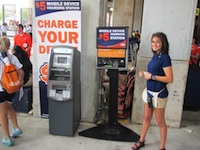Universities Add Mobile Device Charging Stations to Campus
- By Dian Schaffhauser
- 10/04/11

Auburn University's charging station (pictured) costs users $5 per charge. Towson University is offering the charging service for free. |
Four universities in the United States have started offering their students a speedy way to recharge their cell phones and tablets. Baltimore-based NV3 Technologies (NV3), a company that sells kiosk technology, has placed its charging stations at four institutions: Auburn University in Alabama; the University of Alaska with multiple campuses; the University of Miami in Coral Gables, FL; and Towson University in Maryland.
At Towson, the charging service is free. "Since installing the NV3 cell-phone charging kiosk in our student union, a very high traffic area right in front of the entrance to our university book store, students have inundated us with positive feedback," said Ralph Valle, director of marketing and new products at Towson U. "It's no secret that today's college students spend a significant amount of their time--both personal and for their studies--on their smartphone, tablet or other mobile Internet computing device. NV3's kiosk provides them with a very convenient, secure, accessible resource for them to charge their device."
Auburn U's kiosk charges users $5 per charging. The university has allowed a private vendor, Commerce Networks, to place a charging station inside its stadium gates and takes a percentage of the revenue it generates. "Students and fans are constantly using their mobile devices to update friends on the game, post messages via twitter and Facebook, or track scores from games around the country and with that having low batteries on their devices," said company Chairman Thomas Sparrow. "With the thousands of visitors to the 87,000 seat Jordan-Hare stadium for every home game, this helps provide an excellent customer service amenity to fans and provides an additional revenue opportunity to the vendor and school."
The Maryland and Alaska campuses have deployed NV3's floor model, the NTC 32; The Alabama and Florida schools have gone with the vendor's desktop model, the NTC-1912.
Each kiosk can charge 12 devices simultaneously and includes "major plugs" to fit the devices being charged. Both also have LCD screens that can display images, loops, and videos running from flash drives or remotely via the Internet. NV3 said in a statement that the charging components are accessible and ADA-compliant. The floor unit, which is 73 inches tall, retails for $6,500, not including options. The desktop unit, which is 24 inches tall, retails for $2,150 without options.
About the Author
Dian Schaffhauser is a former senior contributing editor for 1105 Media's education publications THE Journal, Campus Technology and Spaces4Learning.